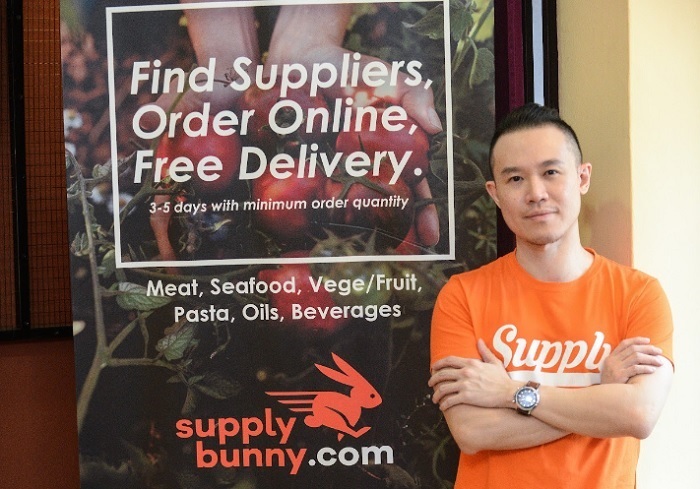Digerati50: For Tham Keng Yew of SupplyBunny, the journey has been of mistakes made, lessons learnt, relationships built
By Karamjit Singh February 19, 2022
- Lessons are more valuable when they come from own failures
- Goal is to improve instead of complaining someone else took away business

Digital News Asia (DNA) continues its series that profiles 50 influencers who are helping shape Malaysia’s Digital Economy, from Digerati50 2020-2021 (Vol 4), a special biennial print publication released in July 2020. The digital copy can be downloaded from the sidebar link.
The following in an expanded version of the article which first appeared in print edition in June 2020.
Working on his third startup, Supplybunny.com, a procurement platform for F&B businesses launched in 2016, Tham Keng Yew felt that his 8-years as an entrepreneur, with the lessons learnt, would help him figure out most of the nuances of riding the wild startup waves and be successful this time.
And it seemed to be working. While not a runaway success, up till 17 March 2020, before Malaysia’s Movement Contril Order (MCO) was enforced, Tham was serving over 2,000 restaurants in the Klang Valley, all the while refining and improving his procurement platform to live up to the vision “to reduce the number of tollgate middlemen” that marked-up the price of products without adding any value to the supply chain.
“There are a total of 70,000 retail small and medium enterprise food businesses in Kuala Lumpur with no leader and no monopoly in the market as of now,” said Tham, relishing the prospect of becoming the market leader. But then the pandemic hit and overnight he lost 60% of sales.
But even more amazing was that, instead of hoping for a short lockdown period, Tham and his team swung into action right away to build a consumer driven wholesale grocery site – in 24-hours. Impressive, considering Supplybunny makes and grows nothing of its own. Tham had to convince suppliers to buy into the overnight shift in business direction.
Fortunately the digital revolution was already underway with a majority of traditional businesses acknowledging they had to adapt even though the urgency to adapt was not there yet. “It used to be that I had to convince 80% of them about the value of digitisation but now almost 100% of them are willing to go digital,” he recalls of that period, right after the first MCO was declared.
As a result of this mindset shift Tham and his team were able to persuade and educate suppliers on how to deliver to condominiums and houses instead of to restaurants, cafes and home kitchens. To ensure timely delivery, he hired his own drivers as well.
The result? Grocery sales shot up. “People were trying to save and they didn’t mind buying in bulk to save.”
Suppliers even started to create packages and bundles to suit consumer requirements. He now has 200 suppliers and 11,000 stock keeping units (SKUs) on the platform.
Are sales sustainable though? Especially after the MCO is fully lifted? For a glimpse of Malaysian consumer behaviour, Tham looks to China where there is a 60% retention of online grocery shopping, post-pandemic. He expects to see a similar pattern here.
“We have made the decision to pivot towards wholesale groceries business catering to B2C and B2B,” he said, aspiring to breakeven by year end and turn profitable in Q1 of 2021.
With so much of the local market to tap, Tham admits regional expansion is not a priority. Instead, he is focused on the goal of gaining a more dominant position by capturing about 20% of the Klang Valley market.
While most founders are more than happy to exaggerate how their product and services are superior to the competition, Tham is more grounded and candid when asked about similar platforms in the market. “I don’t think any of us are different at this point. I tell my team to make sure we are doing a better job. We are better off trying to improve ourselves instead of complaining someone else took our business.”
Four years into Supplybunny, and with more than a decade’s experience as a battle-hardened startup entrepreneur now, Tham has a lot to reflect upon. “The lessons are more valuable when they come from my failures,” he admits candidly. In his first startup selling tickets online in 2008, he barely knew how to be a competent CEO, lead a team, raise funds and build valuable relationships. He now feels he has a better handle on things.
“My lead developer today was an intern at my first startup. My investors that were there to back me from that first venture, they continue to back me today. It may sound like I did this overnight, but it’s the accumulation of years of making lots of mistakes, lessons learnt and relationships built,” he shared.
Digerati50 2020/2021 is proudly sponsored by Maxis - Powering Malaysia's 5G era.
Related Stories :

